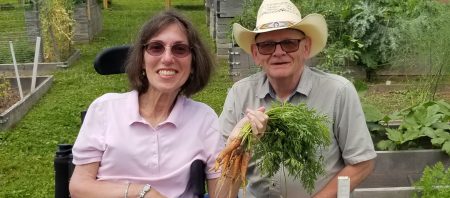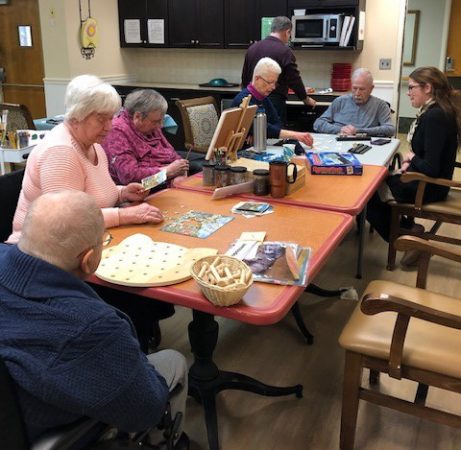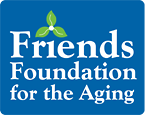Donate
Please send donations to Friends Foundation for the Aging, PO Box 1081, Langhorne, PA 19047 or call 215-478-6663 for direct deposit instructions.
History of the Friends Foundation for the Aging

Friends Foundation for the Aging (FFA) is a private foundation; an independent, nonprofit corporation born from the sale of the properties of the McCutchen Friends Home, a former Quaker residential facility for older adults in North Plainfield, NJ.
The original home, a grand Victorian mansion built in 1886 for Charles W. McCutchen and his family, was donated to the Religious Society of Friends in 1950 when Charles’ daughter Margaret McCutchen, felt she could no longer live there. In her words, “although not a member of the Society of Friends, I have such admiration for their ideals and such confidence in their administrative ability, that I have offered the property as a gift, to be used for such purposes as they deem best.” Shortly thereafter, the McCutchen Friends Home was opened as a 17-room boarding home for the elderly, with meals and some assistance provided as might be needed. In 1965 and 1975 a 25-bed nursing wing and six independent apartments were added to the site.
After years of facing changing needs of aging adults in a time of increasingly different service models, and reviewing a range of strategic alternatives, the Board of the McCutchen Home decided in 2007 to sell the properties and become a grant-making organization. All remaining residents were settled appropriately in other communities.
In 2008, the sale was completed, and the name changed to Religious Society of Friends Foundation for the Aging, Inc. (dba Friends Foundation for the Aging). A new mission statement was adopted, “to support and promote high-quality programs and services for older adults that enhance their quality of life and foster independence, respect, dignity and security within a framework that reflects Quaker values, mutual caring and concern.” Grants are made from the endowment funds.
Under new executive leadership the Board made FFA’s first grant late in 2008. The Board continues to evolve its understanding of its role and responsibilities in the world of grantmaking and philanthropy where there are few foundations that focus on aging issues. FFA aligns with many Trust Based Philanthropy principles.
As a result on ongoing strategic discernment, the foundation has shifted focus from Quaker lifecare communities to lower income people aging in place. It affirms a first priority of supporting Quaker organizations that serve low and middle income aging adults, and then small (budgets under $5 million) community-based organizations addressing needs of people aging in underserved neighborhoods in New Jersey and the Philadelphia area. The board seeks a wide variety of programs, including ones addressing loneliness and isolation, food insecurity, and social determinants of health. Community grantee partners are asked to take a sabbatical year after three years of funding to allow opportunities for new partners. Approximately 25 grants are made each year.
The current FFA Trustees live in NY, NJ MD and PA. 80% are members or attenders of New York and Philadelphia Yearly Meetings of Friends. The trustees represent a variety of backgrounds and expertise including professionals in the aging field, as well as banking, law, and business. There have been three executive directors, each with their own contributions to the organization.
FFA has been a member of:
- Grantmakers in Aging
- American Society on Aging
- Friends Services Alliance
- Council of New Jersey Grantmakers
- PEAK Grantmaking
- NJAAW
Mission

Friends Foundation for the Aging is a Quaker foundation supporting organizations that provide innovative, sustainable, equitable programs and leadership to advance healthy aging for older adults and their families, grounded in Friends’ values.
Vision
A world where older adults have dignity and self-determination, are valued and respected, and have adequate resources, housing, healthcare, support and community.
Values:
Friends Foundation for the Aging values and philosophy flow from the Quaker testimonies of simplicity, peace, integrity, community, equality (equity), and stewardship, providing the lens through which possible grants are viewed. Guiding principles include:
Guiding Principles (description below):
- Service to diverse populations
- Potential to create change
- Leveraging resources
- Collaboration
- Engagement of employees and participants
- Integration of services
- Continuing engagement of FFA
Priority Areas:
- Quaker organizations and those with aligned values
- Underserved populations and small grass-roots community-based organizations that struggle to find funding elsewhere
- Innovative projects that target specific focus areas that present models for sustainable replication and engage collaboration toward aging well
- Coordination of care and support of family caregivers
- Development of future leaders in aging services
- Intergenerational interaction
- If not Quaker, organizations in the Greater Philadelphia-New Jersey- New York region.
Guiding Principles defined:
- SERVICE TO DIVERSE POPULATIONS We believe firmly in diversity, equity, inclusion and justice. Thus, we place high value on programs that are explicit in their reach to people of different cultures and races, to people of varied economic means, and to people of different sexual orientations, especially those who are disadvantaged. We also value programs that include opportunities for intergenerational learning. We further believe that an organization’s commitment to diversity, equity and inclusion should be reflected in its board, staff and participants/residents.
- POTENTIAL TO CREATE CHANGE We seek to change systems that are ineffective, unjust or demeaning of older adults and to help build programs and practices that are based on new understandings of the potential of people in the latter years of life. Thus, we favor programs that are innovative and impactful, and that hold potential for changing old patterns of care and services. Proposals must offer a means through which the new models or new understandings can be effectively demonstrated and shared so that they can be evaluated for achieving goals and adopted by others.
- LEVERAGING OF RESOURCES We seek to support initiatives that attract other resources and that can become self-sustaining over time. We are eager to join with other funders in support of proposals, and to work with organizations that steward their resources well and make the most of limited funds. We are especially interested in supporting programs that include strategies for self-sufficiency beyond a developmental or demonstration phase. This could be through new revenue streams, fees and reimbursement, integration into existing budgets or other means. While open to supporting programs for more than one year, grants typically are awarded on a one-year basis.
- COLLABORATION We believe that the challenges of meeting the needs of older adults, now and in the future, require active cooperation. Thus we are supportive of collaborative efforts among or between service providers and other potential partners. We are particularly interested in programs that draw different kinds of agencies and organizations into collaborative relationships and in proposals that draw on the resources and capacities of varied institutions.
- ENGAGEMENT OF EMPLOYEES AND PARTICIPANTS We are convinced of the creative potential of people at all levels of organizations when engaged effectively in planning and implementing programs. Thus, we favor proposals that demonstrate such involvement, especially involvement of direct care or front line staff and of those the program seeks to serve and organizations that provide opportunities for employee support and career advancement.
- CONTINUING ENGAGEMENT OF FRIENDS FOUNDATION FOR THE AGING We strive to build mutually trusting relationships with grantee partners. We feel led to support innovative work with older adults. We see funding as part of a broader collaboration which includes engaging with prospective grantee partners to shape as powerful a program as possible. We also seek practical ways of remaining engaged after a grant is made, not only visiting and receiving reports of progress and challenges, but working in continuing partnership with grantee partners to maximize the effectiveness and impact of their work. Open communication is critical to this success.
- INTEGRATION OF SERVICES We are committed to services that address the fullest possible range of seniors’ needs: physical, social, emotional, intellectual, spiritual and purpose. We favor programs that break out of the traditional molds of social service and healthcare delivery, creating new partnerships and solutions.
Strategic Plan
Click here for strategic plan document
Click here for FFA at a Glance document 2022
Click here for FFA at a Glance graphic 2022
990PF
Click here for 2020 990PF
Click here for 2021 990PF
Click here for 2022 990PF
Click here for 2023 990PF
Click here for 2024 990PF
Board of Trustees
Eric Andrews
Ed Elder
Doreen Boerner-Gage
Tyler Hoff
Beth Hudson Keller
Joan Malin
Nikki Mosgrove
Patti Nesbitt
Lisa Ogletree
Conrad Person
Emily Sandusky
